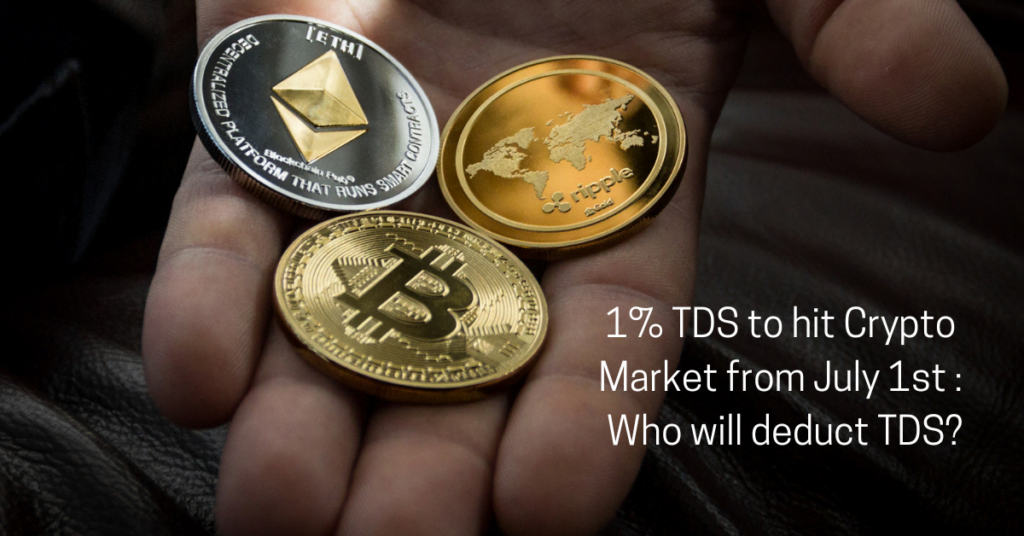1% TDS will be levied on the transfer of virtual digital assets (such as crypto and NFTs) from July 1st as stated by the finance minister Nirmala Sitharam stated in the Union budget 2022.
Whereas 30 % Tax has already been imposed on crypto investors, now it will be interesting to see how 1% TDS impacts the crypto market in India.
TDS will be applicable if the value or aggregate value of the consideration for the transfer of cryptos will exceeds Rs. 50000 during the financial year in case of consideration being paid by a specified person and Rs 10,000 rupees in other cases.
The Central Board of Direct Taxes (CBDT) has issued guidelines related to 1% TDS deductions on crypto where they clarify the maximum doubts.
Transactions on which TDS will be Applicable
TDS will be levied on sellers only.
1% TDS will be applicable on every sell order of all crypto assets from July 1st.
This 1% TDS may be claimed as a return while filing ITR for the financial year.
Transactions on which TDS will not be Applicable
No TDS will be deducted from buyers if they buy cryptos using INR. Only in the case of the peer-to-peer transaction; the buyer has to deduct 1% TDS before making the payment.
TDS Imposed on Crypto to Crypto Exchange
If a person transfers cryptos to another person in the exchange for other cryptos then both will be buyer and seller and TDS will be applicable to both.
Who will Deduct TDS?
Crypto Exchange Platform –
If the crypto users are using the crypto exchange platform for transactions, then the crypto exchange platform will deduct the TDS and later pay to the income tax department while filing the return.
Peer to Peer Transaction –
Crypto buyers have to deduct TDS if they are doing peer-to-peer transactions (no third party involved).
Why 1% TDS on Cryptocurrency?
Growing investment in the crypto market has always been considered a threat to the Indian economy due to its decentralized nature. Decentralized cryptocurrencies are very popular because of their nontraceable feature.
By imposing 1% TDS on each crypto transfer government can trace transactions and prevent tax evasion.
To be a part of the digital currency revolution, the government is also working on central bank digital currency. CBDC will be a centralized digital currency regulated by RBI.
How will it impact Crypto Market?
After the 30% Tax rule came into an effect, many crypto exchanges reported a huge drop in the volume of crypto trading.
Crypto exchange platforms reportedly requested to lower the TDS rate as they fear this would discourage daily traders and trade volumes will go down completely in India.
Sellers will be affected more due to 1% TDS compliance compared to buyers. There will be no burden of taxes on buyers if they are using crypto exchange platforms.
Check guidelines issued by the Central Board of Direct Taxes (CBDT) related to 1% TDS.
FAQ – Crypto Tax in India
What are Virtual Digital Assets (VDA)?
Virtual Digital Assets are the digital or online form of assets that can only be accessed via computer or phone connected to the internet. Example – Cryptocurrency and NFT
What is Peer to Peer Transaction?
The peer-to-peer transaction allows the transfer of cryptos without any mediator. All the transactions get recorded on distributed ledger based on blockchain technology.
What is Cryptocurrency?
Cryptocurrency is an electronic or virtual form of digital currency which can be accessed via phone or computer and can be stored in a digital wallet.
Related Articles –
1) What is the Impact of Crypto Tax on Investors?
2) 30% Tax imposed on virtual digital assets (VDA)
3) Cryptocurrency Guide 2022 – Things You Should Know Before Diving Deep

